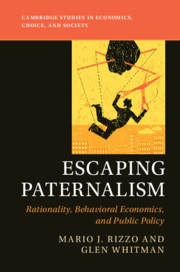Book contents
- Escaping Paternalism
- Cambridge Studies in Economics, Choice, and Society
- Escaping Paternalism
- Copyright page
- Contents
- Figures
- Tables
- Preface
- 1 Introduction
- 2 What Is Rationality?
- 3 Rationality for Puppets
- 4 Preference Biases
- 5 The Rationality of Beliefs
- 6 Deficient Foundations for Behavioral Policymaking
- 7 Knowledge Problems in Paternalist Policymaking
- 8 The Political Economy of Paternalist Policymaking
- 9 Slippery Slopes in Paternalist Policymaking
- 10 Common Threads, Escape Routes, and Paths Forward
- References
- Index
1 - Introduction
Puppets and Puppet Masters
Published online by Cambridge University Press: 02 December 2019
- Escaping Paternalism
- Cambridge Studies in Economics, Choice, and Society
- Escaping Paternalism
- Copyright page
- Contents
- Figures
- Tables
- Preface
- 1 Introduction
- 2 What Is Rationality?
- 3 Rationality for Puppets
- 4 Preference Biases
- 5 The Rationality of Beliefs
- 6 Deficient Foundations for Behavioral Policymaking
- 7 Knowledge Problems in Paternalist Policymaking
- 8 The Political Economy of Paternalist Policymaking
- 9 Slippery Slopes in Paternalist Policymaking
- 10 Common Threads, Escape Routes, and Paths Forward
- References
- Index
Summary
Behavioral paternalism rejects the view that individuals always do the best for themselves, by their own lights and given their constraints. A large number of systematic mistakes called biases allegedly prevent individuals from enhancing their own welfare. This general position supports an array of policy prescriptions designed to correct their decision-making. Ideal decisions are those neoclassical agents would make if they were not plagued by biases. These are the decisions of a model construct (a “puppet”). We review the leading paternalist policy proposals and their behavioral rationales. We then preview some of our criticisms and summarize the contents of subsequent chapters.
Keywords
- Type
- Chapter
- Information
- Escaping PaternalismRationality, Behavioral Economics, and Public Policy, pp. 1 - 24Publisher: Cambridge University PressPrint publication year: 2019

